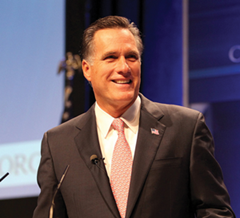US presidential election: The American dreams
Stephen Dineen talks to Democrats and Republicans in Ireland about their priorities for the next four years.
One Saturday a month, Democrats Abroad Ireland meet in Dublin’s Arlington Hotel for political discussion and drinks. About 30 turn up on a sunny October afternoon to watch a recording of the vice-presidential debate. The hotel shares its name with the resting place of one of the Democrats’ most iconic presidents. The hope among many members in 2008 was that Obama was another JFK in the making. Four years on, few feel the same.
Patti Shields, a retail consultant originally from North Carolina, is frustrated. “I think a lot of us kind of wanted business as usual to change in DC,” she tells eolas, “and it hasn’t changed maybe as fast we thought it would.” The promised bi-partisanship hasn’t materialised.
Shields highlights Obama’s flagship Affordable Healthcare for America Act and its impact for people such as octogenarian parents. “I’ve seen the benefit to them in terms of paying less for their prescription drugs out of pocket, so there’s little bits of good news.”
Dennis Desmond, originally from Massachusetts, has been Chair of Democrats Abroad Ireland for four years. “You know for myself it’s more of a mixed bag because I’m well to the left,” he says of Obama’s four years but he has “no complaints based on what he was up against.” Primarily, Obama stabilised the economy: “He passed the Stimulus Bill; he either created or saved millions of jobs, and that stopped the recession.”
Jim Connell, a community radio presenter and volunteer with the charity Crosscare, feels some disappointment. “One of the things that’s dear to my heart would be immigration reform,” he says, “and unfortunately we have not been able to see any major movement on that.”
“In the early 90s, a lot of the immigration visa programmes were geared towards helping the Irish,” says Connell, who’s originally from The Bronx. “Then, as it became more difficult to get it through Congress, they had to expand the envelope to all ethnic groups.” Progress has been lacking because “you have to be fair to all ethnic groups.”
While most of those gathered grew up in America, Gerry Butler is from Dublin. He lived in Alameva near San Francisco for 35 years before returning 12 years ago. Obama’s visit to Ireland “is going to help Ireland hopefully with a mind to The Gathering in Ireland next year.”
Jobs will be central for the next presidential term, according to Desmond, along with fairness. America must “stop being a nation that caters to the rich and start being one that caters again to [the] middle class, like we used to be.”
For Shields, who grew up in a Republican family, which party occupies the Oval Office is important for women: “They believe in small government when it comes to overall broader social services, but yet they want to tell me what I can and cannot do with my body.”
 From bad to worse: ‘Bush was bad and Obama is double that’
From bad to worse: ‘Bush was bad and Obama is double that’
“I guess the time has been wasted really,” says Tom Plank, Chair of Republicans Abroad Ireland, about the Obama years, defined by “three years of spinning our wheels in the mud.”
Out of Knocknacarra, County Galway, the 31-year old private trustee is developing a nascent Republican chapter. Plank estimates that there are less than a hundred active Republicans in Ireland. No party meetings have taken place, but Plank has been organising meetings at “individual, small group level” to develop the base.
Obama “should not have gone down the route of healthcare [reform], which adds this tremendous regulatory burden on businesses and is an economic growth killer right at the get-go.” The economic stimulus was also disastrous “because it was just hundreds of billions of dollars of wasted money,” says Plank. Meanwhile, the deficit was not tackled. “Oh he’s done terrible,” he states. “Bush was bad and Obama is double that.”
When asked what the President has done well, Plank cites the loosening up of regulations to allow private companies to get involved in space exploration. While Obama’s visit to Ireland was successful, he claims that his economic policies have inadvertently damaged this country. “If the United States isn’t growing, then Irish exports are hurting.”
Romney “recognises that the regulatory state is just killing innovation in the United States, which goes of course with public spending and all the rest.”
Plank, who has been living in Ireland for over a year but whose mother was Irish, describes himself as fiscally hawkish but “socially more libertarian”.
The next four years must be about “the debt, the deficit and foreign policy.” Dealing with the deficit is paramount: “It’s just like with Europe, that’s what’s holding back the economy.” Failing to deal with America’s economic problems will result in “the bankruptcy of the United States, the whole western world for that matter.”
Iran poses the biggest challenge in foreign policy terms. “We’ve had a lot of missed opportunities. One, when they had the Green Revolution there in 2009, Obama didn’t do anything to support them,” he says. “Worse really than that is he acted quickly to re-legitimise the regime even after they did that brutal crackdown on their own people.” He cites US participation in UN meetings with the regime in October 2009.
Despite the often bitter nature of the campaign, evidenced by the TV campaign ads, Plank rejects the notion that the US is a deeply divided society. “Throughout time, I’d say it’s less divided now than it has been in the past,” says the man from Maryland. He adds: “I also think there’s a certain element, though not always true, that often times people bring this up because Democrats aren’t getting their way.”






